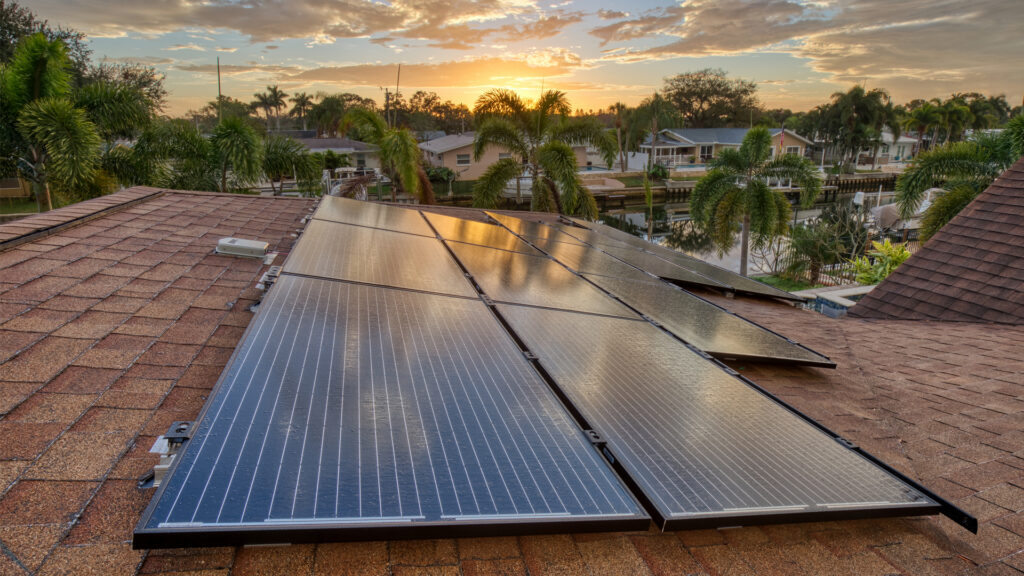By Ellen Cruse, Citizen’s Climate Lobby
I recently flew into the Fort Lauderdale airport. Looking out the airplane window as we approached, I was surprised to see so few homes with solar panels. Some digging revealed that only around 1% of Florida single-family homes have rooftop solar and that Florida was ranked 23rd for solar installations by population, according to the website Solar Power Guide.
Since we are the Sunshine State, why aren’t we getting more energy from the sun?
The cost of installing solar panels has dropped significantly in recent years. Brenda Probasco of Voltage Pro Solar and Electric says solar on a typical Florida home costs about $26,000, but there is a 30% Residential Clean Energy Tax Credit, bringing the net investment down to $18,200.
Based on an estimated average energy savings of $2,500 per year, the solar power investment would pay for itself in about 7.3 years. After that … free power from the sun for 25 years, the estimated life span of the solar panels. That’s a pretty compelling home improvement investment, for sure.
As many as 85% of solar customers install for cost savings reasons, per Brenda at Voltage Pro Solar and Electric. You are doing yourself a favor by generating your own cheap electricity and you will start saving utility dollars immediately. Another benefit is that homes with solar panels sell for about 4% more than houses without, according to Zillow.

If you include the battery storage option in your solar system, you will be able to keep using electricity when the grid goes down. Battery storage systems are becoming more popular since prices came down due to clean energy tax credits. Wouldn’t it be nice to be able to keep your refrigerator running and charge your phone during a power outage?
The Florida Solar Energy Industries Association (www.flaseia.org) is a non-profit organization that empowers Florida consumers to make good decisions about local solar energy and storage. On their consumer page, they explain what questions you should ask installers and other pro tips. There is a member directory of qualified professional installers and a list of insurance companies that are friendly to customers with rooftop solar panels.
I did not use AI to write this, but it is well-known that AI needs massive amounts of energy. The rules of supply and demand tell us that this increased demand will send electricity prices skyward if we do not add energy to the grid.
Florida Power and Light (FPL) recently submitted a request to the Florida Public Service Commission (PSC) to set new rates when its current base rate agreement expires at the end of the year. I checked out the FPL rate calculator and found that the requested rate increase for 2026 is around 6.1% and an additional 4.1% for 2027. FPL currently charges customers with solar a $25 per month net metering fee. If you have the right amount of solar panels, the net metering fee is currently all you pay.
You are patriotically participating in our energy future by installing solar panels. Solar energy technology was invented in America in 1883, according to the U.S. Patent and Trademark Office. Innovation is the American way, and the future will be renewable energy and not petrostates. Why would Americans want to stubbornly dig into fossil fuels with limited supplies, when we could embrace the opportunity to lead the world by installing the panels that allow us to collect the free energy from the sun?
China is now the world’s top producer of solar panels, battery storage and electric vehicles. Let’s embrace American innovation and counter China’s efforts to achieve solar energy dominance. Abandoning our own progress in favor of archaic technology and dirty fossil fuels doesn’t just hurt our environment- it cedes economic leadership to a global competitor.
We need common-sense solutions for our energy needs, and that starts with bipartisan leadership to keep the clean energy tax credits that have saved consumers money and spurred solar installation job growth (currently over 14,000 jobs in Florida, according to irecusa.org). Increased installations of solar systems will spur further American innovation and employment.
Solar is the most genuine form of free energy. The sun comes up every day and those of us living in the Sunshine State are especially blessed by a wealth of energy from the sun. So, what is preventing the majority of Florida homeowners from taking the leap?
Ellen Cruse is the Brevard coordinator for Citizen’s Climate Lobby. This opinion piece was originally published by Florida Today, which is a media partner of The Invading Sea. Banner photo: A worker installs solar panels on a rooftop (IStock image).
Sign up for The Invading Sea newsletter by visiting here. To support The Invading Sea, click here to make a donation. If you are interested in submitting an opinion piece to The Invading Sea, email Editor Nathan Crabbe at nc*****@*au.edu.



